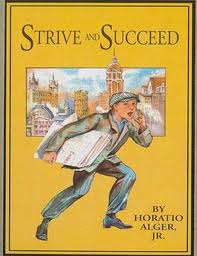Children’s literature promoted work values as part of good character and the  formula to success.
formula to success.
McGuffey’s Eclectic Readers were perhaps the most widely read children’s books in the 19th century with 122 million copies of the six readers sold to an estimated four fifths of US school children. These books taught middle-class values including the work ethic and success through hard work: “Work, work, my boy, be not afraid; Look labor boldly in the face.”
 Other children’s books such as the Peter Parley books and the Horatio Alger stories also taught work values. Alger’s books, some 20 million copies of which were sold, such as Strive and Succeed, Ragged Dick, Mark the Matchboy, Risen from the Ranks, Bound to Rise, told of poor boys who became self-made men through their own efforts and perseverance. Such boys were also honest and faithful to their employers and displayed initiative and self-reliance.
Other children’s books such as the Peter Parley books and the Horatio Alger stories also taught work values. Alger’s books, some 20 million copies of which were sold, such as Strive and Succeed, Ragged Dick, Mark the Matchboy, Risen from the Ranks, Bound to Rise, told of poor boys who became self-made men through their own efforts and perseverance. Such boys were also honest and faithful to their employers and displayed initiative and self-reliance.
In Alger’s story Bound to Rise or Up the Ladder, the hero Harry Walton, a boy from a very poor family, is inspired by reading about Benjamin Franklin, and tells his mother “I don’t expect to be a great man like him. But if I try hard I think I  can rise in the world, and be worth a little money... I read in the country paper the other day that many of the richest men in Boston and New York were once poor boys”. He sets out on the road at 14 years of age to earn enough money to pay off a family debt and finds work as a shoemaker’s assistant. He has his money stolen from him twice but his good luck outweighs the bad, and the reader is encouraged to believe that this is because of his good character which will always win out in the end. He comes home triumphant six months later, pays off the debt and more, and then sets off to start his apprenticeship to a printer, ready to work his way up from the bottom, confident that he will make it.
can rise in the world, and be worth a little money... I read in the country paper the other day that many of the richest men in Boston and New York were once poor boys”. He sets out on the road at 14 years of age to earn enough money to pay off a family debt and finds work as a shoemaker’s assistant. He has his money stolen from him twice but his good luck outweighs the bad, and the reader is encouraged to believe that this is because of his good character which will always win out in the end. He comes home triumphant six months later, pays off the debt and more, and then sets off to start his apprenticeship to a printer, ready to work his way up from the bottom, confident that he will make it.
 Maria Edgeworth was an English author whose stories such as Idleness and Industry were also published in America for over a century. They taught that hard work could lead to success and wealth, and reinforced the model of the self-made man. William T. Adams wrote books such as Work and Win whose heroes were “industrious, useful, and reliable”.
Maria Edgeworth was an English author whose stories such as Idleness and Industry were also published in America for over a century. They taught that hard work could lead to success and wealth, and reinforced the model of the self-made man. William T. Adams wrote books such as Work and Win whose heroes were “industrious, useful, and reliable”.
Many writers were in fact Protestant clergymen, including Horatio Alger, who was forced to leave his ministry after allegations of sexual activities with boys. Protestants sought to reconcile their “teachings with popular materialism” and to ensure that the church remained relevant. Such literature stressed the triumph of good character over obstacles such as poverty, lack of innate talent and skills, and lack of education.
In Britain the myth of the self-made man persisted in children’s literature into the twentieth century. Academic Philip Cohen noted:
When I was growing up in the early 1950s it was still possible to get given ‘improving books’ for one’s birthday, consisting of biographies of self-made men, engineers, inventors, industrialists, entrepreneurs, philanthropists and the like. These men, and they were all men, had usually lived in the ‘heroic’ age of nineteenth-century capitalism and the books themselves were clearly prepared for the edification of the young.